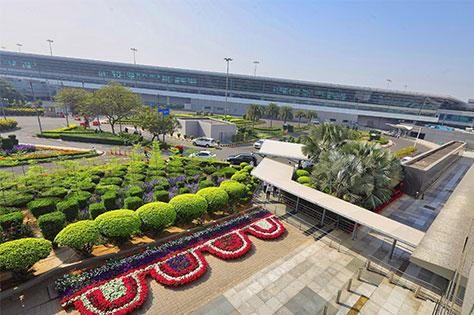
Air transportation has undoubtedly become an essential component of our daily lives, enabling us to travel across vast distances in relatively short periods. However, this convenience comes at a significant environmental cost. The aviation industry, responsible for facilitating air travel, is recognized as one of the largest contributors to carbon dioxide emissions generating a staggering 895 million tons in 2018 alone. Amidst these alarming statistics and the growing concern for the environment, a promising solution emerges:
HORTICULTURE and its potential to address the environmental impact of the aviation industry.
Horticulture breathes new life into airports and their vicinity. By integrating lush gardens and green spaces, the aviation industry embraces sustainability and transforms the once sterile environments into vibrant, visually stunning landscapes. Through the synergy of aviation and horticulture, a path can be forged toward a greener future, where air travel coexists harmoniously with our planet's well-being. Here are some sustainable horticulture practices utilized in airports to balance beauty and minimize environmental impact:
Sustainable Design: Incorporating principles of sustainable garden design, such as creating functional spaces, optimizing natural light, and utilizing passive heating and cooling techniques, reduces energy consumption and promotes harmony with the surrounding environment.
Green Infrastructure: Incorporate green infrastructure elements, such as bioswales, permeable pavements and green roofs, into horticultural designs. Green infrastructure helps manage storm water, reduce urban heat island effect and improve air and water quality.
Efficient Irrigation: Install water-efficient irrigation systems, such as drip irrigation or micro-sprinklers that deliver water directly to plant roots, minimizing water waste through evaporation and runoff.
Plant Selection and Placement: Selecting plants that are well-suited to the local environment, considering factors such as sunlight, soil conditions and climate, is crucial. By choosing plants that are naturally adapted to the area, they are more likely to thrive without excessive inputs. Proper plant placement based on their water and light requirements can also minimize resource consumption and maintenance needs.
Maintenance: Implementing proper maintenance techniques, such as pruning correctly, removing invasive species, and regularly monitoring plant health, ensures the long-term health and vitality of the garden or landscape.
Energy Efficiency: Implementing energy-efficient practices, such as using renewable energy sources for greenhouse operations or utilizing energy-saving technologies like LED lighting, can help reduce the environmental footprint of horticultural activities.
Water Conservation: Designing landscapes with proper drainage and water retention features, such as rain gardens or swales, can help capture and retain rainfall, reducing runoff and promoting water infiltration.
Green Waste Recycling: Develop a green waste recycling program to compost garden trimmings, leaves and other organic waste generated from horticultural activities. The resulting compost can be used as a valuable soil amendment.
These practices provide an opportunity for the aviation industry to have a positive impact on the environment and advance toward a greener future. GEMS (GMR Engineering and Management Services), a subsidiary of the GMR Group, a well-known infrastructure developer in India, is widely regarded as a pioneer in implementing these procedures and paving the pathway for others to follow suit.
GEMS is an innovative company that is revolutionizing the world of aviation horticulture. Their dedicated team of experts, including horticulturists, irrigation engineers, and landscape supervisors, are passionate about creating a greener and healthier future. With its extensive knowledge, cutting-edge technology and unwavering commitment, GEMS is making a positive impact in the field. In addition to their primary services, GEMS specializes in various other areas to enhance the environment:
GEMS believes in striking the perfect balance between efficiency and beauty in all their projects. With their commitment to best practices and innovative technologies, they are leading the way in sustainable aviation horticulture, shaping a future where green landscapes thrive alongside aviation activities.
If you need any services, drop us a mail at Rohitkumar.Singh@gmrgroup.in or get in touch with us at +919717199753.
MAKING EFFICIENCY LOOK BEAUTIFUL!